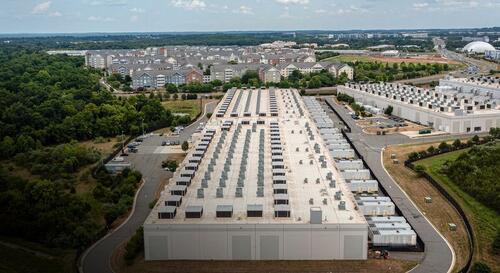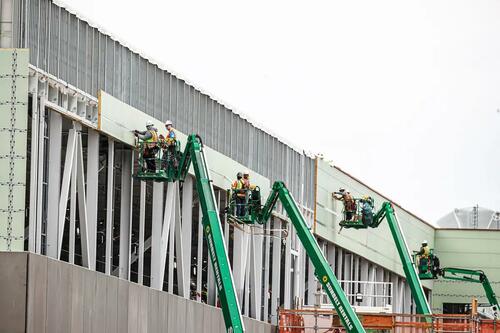Authored by John Haughey via The Epoch Times (emphasis ours),
From Georgia to Oregon, New England to New Mexico, data center projects are drawing opposition in local government hearings by residents concerned about the voracious demand for electricity, water consumption, and noise. Critics also argue that data centers don’t produce the jobs other land uses generate.
In Texas, people in small towns question data center development in the broader context of rapid rural industrialization.
In Pennsylvania, ad hoc groups say data centers are tapping into nearby natural gas fields, increasing the frequency of fracking, and straining water supplies.
In Indiana, Minnesota, Kansas, Nebraska, and across the country, residents say the scale and proximity of these high-tech campuses degrade their neighborhoods and devalue properties.
Objections vary, depending on proposal and site, but a common complaint is state and local governments offering data center projects tax incentives that are often shielded from public scrutiny through nondisclosure agreements.
Companies say these pacts shield proprietary corporate intelligence, but the perceived lack of transparency fosters suspicion and anger when residents realize local planners are set to approve a proposal they knew little to nothing about until it appeared to be a done deal.
“Just from our experience, it seems like one of the big concerns is that, yeah, there is no community outreach,” Kamil Cook, Public Citizen’s Texas climate and clean energy associate, told the Epoch Times. “There’s no method by which the community can be informed in a way that actually makes it seem like their voice is valued and that they have a choice in these matters.”
Much of this local opposition appears rooted in the complaint that people “weren’t informed to begin with, were ignored at some point,” said Joe Warnimont, who co-authored a February HostingAdvice.com survey. The survey of 800 people in 16 states found that 93 percent agreed that “cutting-edge AI data centers are vital to the United States,” but only 35 percent want one in their town.
“The main insights are there is clearly a disconnect between what the local residents experience and what is being sold to these communities from developers,” Warnimont told The Epoch Times.
Protect PT executive director Gillian Graber said her western Pennsylvania nonprofit had no idea that planners in Westmoreland County’s Upper Burrell township were considering TECfusions’ bid to build a data center at a former Alcoa site, until reading a local newspaper article.
“We were, like, ‘What is this thing? What’s happening? What does that mean for the community in Upper Burrell?’” she told The Epoch Times.
When residents contacted local planners and officials “early on” to get project details, they wouldn’t discuss specifics, or “they didn’t really seem to know a lot about it,” Graber said.
Protect PT, which stands for Protect Penn-Teller, was founded in Graber’s Harrison City living room a decade ago to challenge fracking and other industrial development some residents say are degrading the area’s environment, she said.
They haven’t won many battles, but they continue to show up.
“Like with everything we work on, it’s always larger corporations and large industries that come into rural communities and think they can just do whatever they want,” Graber said. “We don’t want to see that happen again … but I see history repeating itself again, and again, and again.”
A cursory Facebook search finds dozens of ad hoc local groups with pages where similar claims are aired.
Texans in Granbury say “working-class residents living next to giant, loud, environmentally-destructive data centers are the ones paying the price for Texas’s crypto boom.” Minnesotans call on state legislators to impose more restrictions because “these developments are reshaping our communities.”
The 3,500 members of the Stop Duneland and Valpo/Wheeler Data Centers Facebook group in Indiana express frustration that a planning commission has threatened to waive public hearings on a proposed data center project. The page is rife with comments such as, “We have no voice anymore? Seems like that’s a dictatorship in my opinion.”
Tax Revenue Boon
The Data Center Coalition, which represents 36 “hyperscalers”—corporations including Meta, AWS, and Microsoft—and co-location companies that own data centers leased to operators, such as Equinix, acknowledged data center projects are drawing resistance in some areas, but noted most criticism is standard for any development proposal.
“I think that sometimes gets lost in media coverage,” Jon Hukill, communications director of the Washington-based coalition, told The Epoch Times. “Data centers want to be good neighbors. They communicate with HOAs [home owners associations] and citizens and local and state governments before, during, and after the permitting process.”
“The data center industry is not monolithic. There are a wide variety of companies,” Hukill said.
Data centers are expensive to build and plan to be operating in a community for many years, he said, so developers and operators strictly follow laws, zoning, and land-use regulations.
Read the rest here…
Loading…



















